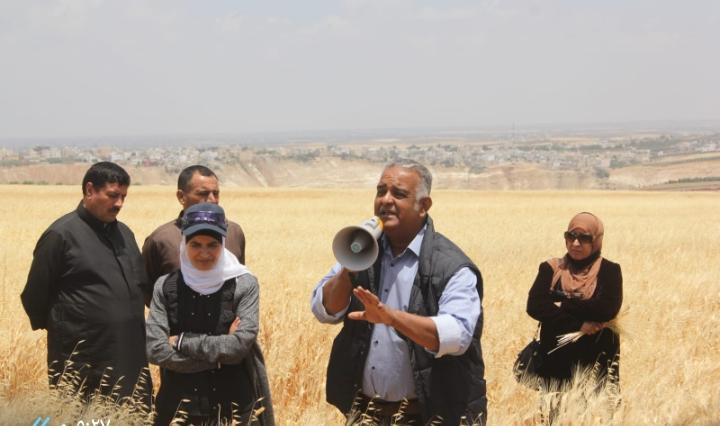- Local News
- Web-2022-05-25 | 07:58 am

Nayrouz News Agency :
On behalf of Dr. Nizar Haddad, the Director General of the National Agricultural Research Center (NARC), Eng. Yahya Bani Khalaf, the director of Ramtha Research Center, inaugurated a workshop on "Field Crops Production Current Status in North Jordan” within the activities of the project "Use of genetic diversity in Evolutionary Plant Breeding”, implemented by NARC and Bioversity Intenational, funded by the International Fund for Agricultural Development (IFAD).
Bani Khalaf expressed NARC’s persistence in keeping up with modern technologies and implementing scientific research outputs by adopting modern techniques and seeking solutions to challenges facing wheat and barley in particular; besides, harnessing the role of Ramtha stations to conduct agricultural projects that contribute to agricultural development.
Dr. Nawal Al Hajjaj, Head of field crops department at NARC and the project coordinator, highlighted that the challenges and obstacles this sector faces in North Jordan, are strongly correlated to low rainfall and temperature fluctuations as a result of climate change impacts, which in return caused a massive loss in field crops sector and low productivity, as well.
During the workshop, Al Hajjaj encouraged farmers to preserve seeds for the next year, at the same time, she encouraged cooperation among farmers in harvesting operations to reduce costs, paying attention to the valuable role of farmers in keeping up with field crops cultivation and its current situation in the north and other areas in Jordan.
Al Hajjaj stated that farmers must interact with NARC researchers in agricultural research centers and stations among the different regions in Jordan, for the purposes of capacity building, experience exchange, and research outcomes implementation to contribute to achieving sustainable development goals.
Eng. Ahmed Al Bataineh, Head of Maru Agricultural Research Station, said that this workshop, which targeted a number of wheat and barley farmers in North Jordan, included field visits to experiments implemented inside and outside Maru station, to assess and familiarize farmers with improved varieties and genetic diversity experiences that would keep pace with climate changes and reduce its impact on the field crops sector.









